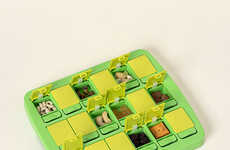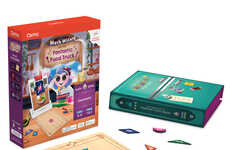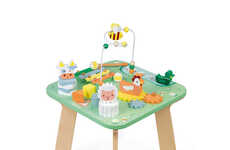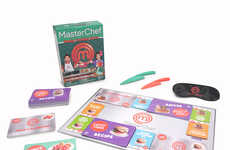
The ‘Noodle Knockout Fine Motor Game’ Requires Two to Four Players
Caitlyn Fernandez — January 24, 2022 — Life-Stages
References: learningresources
The ‘Noodle Knockout Fine Motor Game’ is perfect for children between the ages of four to eight. The game is interactive and challenging as it tests their motor skills and helps teach them shapes, colors, and counting.
There are many ways for children to play as they can follow and fill the bowls according to the “order” sheet activities, recognize patterns and shapes depicted on the spinner, and count the number of ingredients needed. Using the “tongs,” kids can exercise their hand-eye coordination, hand strength, and fine-tune their motor skills as they pick up each food item.
Parents and guardians can purchase the Noodle Knockout Fine Motor Game for their kids on the Learning Resources online store.
Image Credit: Learning Resources
There are many ways for children to play as they can follow and fill the bowls according to the “order” sheet activities, recognize patterns and shapes depicted on the spinner, and count the number of ingredients needed. Using the “tongs,” kids can exercise their hand-eye coordination, hand strength, and fine-tune their motor skills as they pick up each food item.
Parents and guardians can purchase the Noodle Knockout Fine Motor Game for their kids on the Learning Resources online store.
Image Credit: Learning Resources
Trend Themes
1. Food-inspired Children's Games - Creating more food-inspired children's games that are interactive and challenging can help teach children motor and cognitive skills.
2. Fine Motor Skill Development - Developing games that help children strengthen their fine motor skills through interactive play can aid in their overall development.
3. Educational Games for Children - Producing engaging and educational games for children that promote learning through play can be an effective way to teach new skills.
Industry Implications
1. Toy Industry - Toy companies can capitalize on the trend of food-inspired children's games to create innovative games that cater to children's developmental needs.
2. Education Industry - Educational companies can create more interactive games that teach children new skills that they may not learn through traditional methods.
3. Online Retail Industry - Online retail stores can sell more educational games for children so that parents and guardians have easy access to these products without leaving the comfort of their own home.
3.1
Score
Popularity
Activity
Freshness















